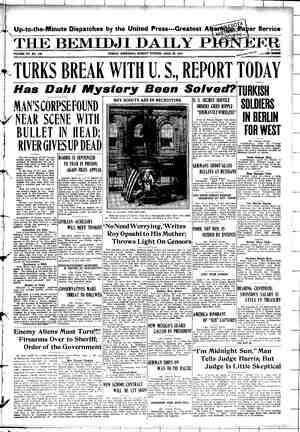New Britain Herald Newspaper, April 23, 1917, Page 6
You have reached the hourly page view limit. Unlock higher limit to our entire archive!
Subscribers enjoy higher page view limit, downloads, and exclusive features.
Npssaper core day excepted) a® u ,.d'ln‘. 67 Church 8 #t the Post Ofice at New Britala Second Class Mall Matter. w4 by carrier to any part of the city 16 conts & week, 865G 8 month. jons for paper to jpe sent by matl in advance. ¢f cents s mouth. & your. ‘only profitable advertismg medium city: ~Circulation books and press always open to advertisers. 14 will be founa on sale at Hota- News Stand, 43n Brosd- it = tha ‘8t._and %)gn Tork City: Board Walkc At- 7 snd Iy ford Depot. ! TELEPHONR CALLS. An American Ideal. If there be no.nobility of de- eent, all the more indispensable At that there should be nobility ascent,—a character .in them t bear rvle so fine and high pure that as men come with- jn the circle of its influence they pvoluntarily pay homage to that Which is the one preeminent dis- ction, the royalty of virtue. '——BISHOP HENRY C. POTTER. /80 in Paris when the vast ma- ty of that populace turnéd out to ‘France’s new ally in the world The day there, the ‘first real of spring this year, was official- jgnated as “United States Day’ booming of a salute of twensé ns, a gigantic American flag was thigforpozen that:siges, around of ‘Eiftel Tower, the.. highest the: worl& Mrshe same the Stars and Stripes were sent ng from the topdf 4t the City all the Governmént buildings, N Apd ‘ ‘houses, Bnlegcin Jupiich the erical asgdor {ook,Part were in front of the equestrian statue eorge Washington in the Place des Unis. ' United States Day” in France is an jor that this country will not for- | The bond of symypathy between } two great repyblics has heen wov- feven closer - together = since ' the jted!Shates entered the war. It had )been a sacred trust. The only ever stood ‘danger of .being ken ‘was~ immediately preceding ‘war of 1812 when this country de- d whether it should declare war ¥France or England. Both - of ‘nations then had offended gt the law of nations in seizing commerce. Roth had the excuse iecessity of war”. TRat we finally d war with England instead of nce'was due, nc doubt, to the glor- past relationship with France as jmplified in the names of Rocham- - and , Lafayette. ‘“United States “in France on this modern occa- § should serve to recall the great expended by thet country on If of the struggling colonies here a -century and 4 half ago. Phe American people will never for- what France did for this country the Revolutionary war. In the F of 1776 France was not found “when we needed a friend. So, war of 1917, the United States - found wanting when France ds g friend. America is no longer t to express merely her admir- Jlor France in the past and all and her sympathy for her today; as Ambassador Sharp appropri- oly said yesterday, “In a cause Which ‘A believes.to bs & sacred’one she will r rate all her power, and the ppd of her patriotic sons, if neces- by, to achieve a' victory: that shall 1 time to come insure the domin- of right over wrong, freedom fir oppression, and the blessings of joe over the brutality of war.” That 6 message of America to France @ occasion in' Paris of ‘United Day”. 3 th 'mr: NEW EPOCH. 4 “Bishop Brent of the Philippines in ‘f prayer for \!mtea'gn' es deliv- fed last week inl.St. Paiil's Cathedral, ndon, ventured the rema that 8 is not merely the/hcginding of Sw era but of a new epoch”. On ixday the Social Democrats of prmany, joined by their brothers in lstria-Hungary, drew up resolutions @Anding the end of bureaucracy in fthese countries, which may end in nfall of the two royal houses, and Hohenzollern. When this Bés about, as it must, sooner or then will the prophetic ‘words of fshop of the Phillppines be real- : “This is not merely the begin- 1§ of a new era, but: of & new och.” Reports of bl and strikes in munition fa %- rmany y or may-not d. Itis conceivable that:1he: mur?




